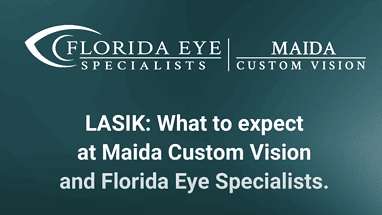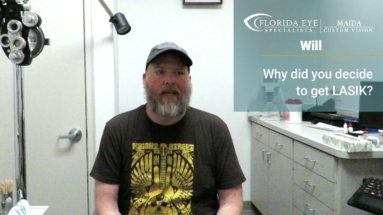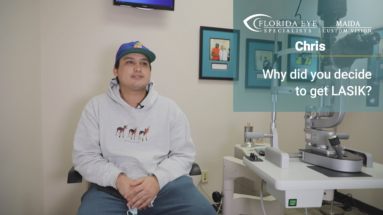Hear from our Clinical Director and Laser Suite Supervisor, D.D. Jewell, about what you can expect during your complimentary LASIK…
Find Out Whether You Are a Good Candidate for PRK Surgery

Many people mistakenly believe that LASIK and laser eye surgery are synonymous terms. In fact, LASIK was not even the first type of laser eye surgery to be introduced to the American public. That honor would belong to PRK, a form of laser vision correction that is still widely performed to this day.
Indeed, PRK is still the laser eye surgery of choice for many patients who are poor candidates for LASIK, while thousands of patients who are good candidates for LASIK elect to undergo PRK anyway due to its excellent safety profile. Unlike LASIK, PRK does not require the creation of a flap in the outermost layer of the cornea, which of course reduces the risk of flap complications – the most common risk associated with LASIK – to absolutely nil.
Of course, PRK offers its own unique benefits and risks, and while more patients are considered good candidates for the procedure than would be considered good candidates for LASIK, PRK is not for everybody. PRK candidates are carefully evaluated at our Jacksonville practice, Maida Custom Vision, before they are permitted to undergo the procedure. Our meticulous screening process for all procedures helps to minimize the risk of complications and ensure an excellent rate of success.
Are you a good candidate for PRK? Schedule your consultation with Dr. Jerry Maida and find out!
How are PRK and LASIK different?
If more patients are good candidates for PRK than for LASIK, then you may well be wondering how the two procedures are different. In actuality, they are practically the same procedure. They differ only in how the underlying corneal tissue that is reshaped by the excimer laser is accessed. At the beginning of LASIK surgery, a thin, hinged flap is created in the outermost layer of the cornea, known as the epithelial layer. This flap is folded back so that the laser can be applied to the underlying tissues and then replaced once all necessary changes to the shape of the cornea have been made. It is then left to heal on its own, without the need for bandages. As long as patients follow all post-surgical instructions provided to them by Dr. Maida, flap complications are extremely rare; however, they remain a possibility, even with modern LASIK, which is safer and more effective than ever.
PRK makes flap complications a moot concern by removing the epithelial layer of the cornea altogether in order to access the underlying corneal tissues. This layer will regrow over time. While PRK does eliminate the risk of flap complications, it also requires a longer, more uncomfortable period of healing than LAISK. However, many patients consider this a more-than-reasonable trade-off. And for patients with abnormally thin or weak corneas, PRK may be the only laser surgical alternative to LASIK.
Are you a good candidate for PRK?
Again, the only way to know for sure whether you are a good candidate for PRK is to meet with Dr. Maida for a consultation. However, you are probably a good candidate for PRK if you:
- Are at least 18 years old
- Have had a stable eyeglass prescription for at least the last year
- Are free from any disease that could compromise your post-surgical healing
- Are not pregnant or nursing
- Have basically healthy eyes, free from serious conditions such as diabetic retinopathy or glaucoma
Learn Whether You Are a Good Candidate for PRK
To find out whether you are a suitable candidate for PRK surgery, please contact Maida Custom Vision today.



